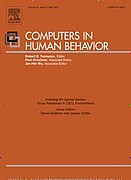New publication in "Computers in Human Behaviors" [31.08.13]
The reciprocity of authenticity and psychological well-being on social network sites.The article "Authenticity and well-being on social network sites: A two-wave longitudinal study on the effects of online authenticity and the positivity bias in SNS communication" by Prof. Dr. Leonard Reinecke (Institut für Publizistik, Johannes Gutenberg-Universität Mainz) and Prof. Dr. Sabine Trepte (Institut für Kommunikationswissenschaft, Universität Hohenheim) was accepted by the journal "Computers in Human Behavior" and is currently in press.
In offline settings, authentic behavior has frequently been linked to increased well-being. Social network sites (SNSs) provide a new venue for authenticity, yet the effects of online authenticity are largely unknown. The present study investigated the reciprocal effects of authenticity on SNSs and the psychological well-being of SNS users in a two-wave longitudinal study (N = 374). The results demonstrate that online authenticity had a positive longitudinal effect on three indicators of subjective well-being. The data further illustrate that this beneficial effect of SNS use is not equally accessible to all users: participants with low levels of well-being were less likely to feel authentic on SNSs and to benefit from authenticity. We propose that the results can be explained in light of a ''positivity bias in SNS communication'' that favors positive forms of authenticity over negative ones.
The article will be published in the Computers in Human Behavior 30 (2014), nonetheless it is already available on researchgate.net.


